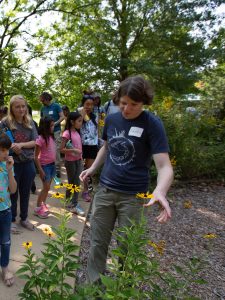By Bianca Xu
In this series, meet members of the University of Illinois’ Research Development Community. Claudia Lutz is the Outreach Manager in the Carl R. Woese Institute for Genomic Biology.

- What are your daily responsibilities?
I always find that an interesting question because every day can look different. But I think there’s a basic set of things that could be happening each day. We always try to have a portfolio of ongoing programs that allow us to offer opportunities for public engagement. What that can look like will vary throughout the year. For example, we have Science Café events and Science at the Famers Market, and other things like that, offering some sort of opportunity for engagement to different parts of our local community. We also have some programs for campus or specifically for IGB members that take more of the form of professional development.
So, depending on how close we are to those different events, some of my time would be spent making sure we have all the materials, hearing from members of the team about what needs to be purchased or activities need to be planned, developed, tested out or refined from a previous time, and making sure we have all the volunteers signed up so events can go forward. I also spent time following up on an event, hearing how it went, and maybe what we could do better next time.
- What motivates you to pursue this career path? Is it because of your academic background or personal interests? And how did you end up in your current role at IGB?
That’s a great question. I think that it’s both. Ever since I was a child, I’ve been fascinated by biology and other sciences, but I also had a deep interest in language and was an avid reader. As I grew older, I never realized I could find a career that merges both interests.
During my graduate studies, I chose honeybees as my subject of study. Studying bees provided a built-in outreach audience – everyone interested in hobby beekeeping loves to talk about bees. So, I had the opportunity to give talks to beekeeping clubs and other groups interested in pollinators, which helped me gain more outreach experience. And partway through grad school, I thought, “OK, I enjoy this stuff.”
So, I chose to focus on how I can keep these elements of science, learning, and communications in my career. And then around that time, IGB decided that, for the first time, they would hire a science writer to work on publications. I applied for that job and got it.
- What do you believe are the factors that contribute to the success and effectiveness of your role at IGB?
The biggest factor is the incredible team at IGB. We have a dedicated group of individuals, each with their unique skills, which allows me to focus on my strengths in writing and reporting on outreach events. Besides, the IGB outreach group has a unique dynamic that’s welcoming and encouraging. It’s a space where everyone is open to ideas and feedback, and we’re all approachable. This friendly and open environment is somewhat distinct from other units and departments, making it a truly rewarding place to work.
- What are some of the challenges you face in your role?
The biggest challenge is reaching people who do not already have an interest in science or a connection to the university. While we can host community events that draw in those who are already interested in learning, the challenge is to engage with those who might not see science as something that’s for them. This could be because they’re too busy, because it’s not on their radar, or because we haven’t made it accessible enough. There’s also a need to engage with those who might be suspicious or distrustful of scientific research due to past negative experiences. Finding ways to reach out to these people and get them engaged is difficult but crucial.
- What upcoming projects or collaborations at IGB are you particularly excited about?
One of our latest initiatives is the creation of a mobile science learning lab. The idea was to address the geographical limitations that prevent students in remote parts of the state from accessing the university’s resources. This mobile lab, housed in a bus donated by MTD, will bring advanced scientific equipment like high-end microscopes and PCR machines to these students. We’re currently in the process of renovating the bus into a mini-lab with plans to install solar panels for power and receive donations of scientific equipment. Once complete, we’ll be setting up a visit schedule with schools around the state, providing these students with hands-on experiences that they might not otherwise have access to.